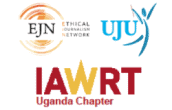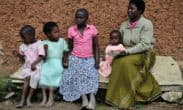Ethical Journalism News
|
| EJN work in Africa continues to strengthen. In Kampala on May 22-23, and in partnership with the International Association of Women in Radio and Television and the African Federation of Journalists, the EJN Africa campaign against hate speech — Turning the Page of Hate — will focus on how media are covering critical social issues such as violence against women and the rights of sexual minorities.
Continue …
|
|
|
|
Turning the Page of Hate in African Media
We welcome the launch of the campaign, Turning the Page of Hate Media in Africa, and call on all journalists and media leaders to practice ethical, tolerant and inclusive journalism and to promote editorial action that will expose all forms of physical and sexual violence against women, including economic, psychological and emotional abuse.
Continue …
|
|

|
|
Turning the Page of Hate Conference, Kampala, May 23rd – 24th 2014
Our aim is to raise awareness in journalism of the need to put hate speech in context and to remove incitement to intense hatred and violence from public discourse. The role of journalism and media in helping to find solutions to this problem cannot be over-stated. Media can help to shape public opinion for action in favour of positive action to defend women’s rights by telling the story of gender violence through the ethical, careful and sensitive prism of quality journalism.
Continue …
|
|

|
|
| Although journalism can do good, it is not its main purpose. Ethical journalists will always tell you they are not about advocacy for one political objective. But good reporting can be a progressive force when it provides useful, reliable and accurate information that builds public confidence and helps people overcome their problems. However, when it comes to dealing with the crisis of violence against women and girls media are often part of the problem rather than being an important potential agent of change.
Continue …
|
|

|
|
| The coverage has been dismissed as “propaganda” in the West – but you do not have to go all the way to Moscow to find biased journalism. Western news outlets have also been criticised for reflecting, even parroting, what their domestic political leaders have been saying about this crisis. Our News Divide this week looks at the biased coverage on both sides of the Ukrainian story. (via Al Jazeera) |
|
PBS Needs To “Not Get In The Way Of Reporters Or Photographers Covering News”
| The handcuffing of a protester in the lobby of a major hotel is a news story—not a PBS story—and taking pictures of the event is part of that news story. To say that “our procedure is for communications staff to manage interactions with reporters” and to “wait until a PR staff member could arrive” is like telling someone not to take pictures of an airplane crashing until the company PR person arrives. (via PBS Ombudsman) |
|
| Fact-checkers and fact-checking organizations aim to increase knowledge by re-reporting and researching the purported facts in published/recorded statements made by politicians and anyone whose words impact others’ lives and livelihoods. Fact-checkers investigate verifiable facts, and their work is free of partisanship, advocacy and rhetoric. (via The American Press Institute) |
|
| We don’t need FCC rule changes that benefit giant corporations. We need an FCC that lives up to its original mission of protecting the public interest. We are now in a “public discussion” period until July so ordinary citizens can voice their opinions of the FCC’s proposed corporate-friendly policies regarding Net Neutrality. (via Huffington Post) |
|
| The fundamental difference between writing about social sciences and science and technology is in the use of analogous examples to explain and elucidate a point or a view. While employing an analogous example enriches our understanding in social sciences, it may backfire as in the case of Subashree’s report because of extreme specificity of each subject. An analogy in a science story forces the writer to add annotations and afterwards to explain the intended meaning. (via The Hindu) |
|
| Women are coming to the fore in a profession long dominated by men, and telling stories their male counterparts couldn’t get. Four leading female photographers talk about their work. (via The Guardian) |
|